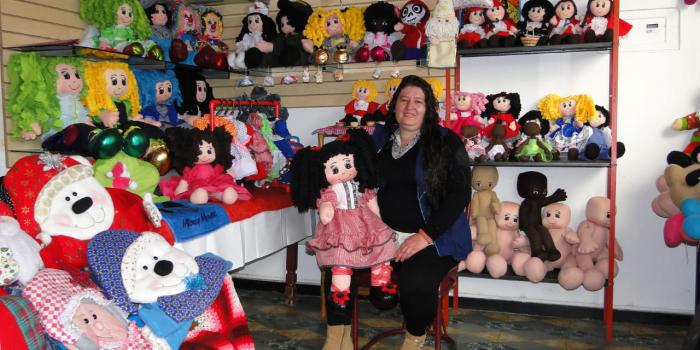
Luz Evelcy, dolls for pain
A victim of displacement and the murder of an uncle, she has been making dolls for seven years so that women and men can forget the sadness suffered by the armed conflict.

By Erick González G.
To meeting, to meeting! Shouts vehemently a man dressed in camouflage in the streets of Mesetas, a town in the western foothills of the Meta department, 138 kilometers from Villavicencio. Peace of mind is gone with that summons. The population knows with resignation that they must obligatorily attend this cabal, their objection means death. Luz Evelcy Henao, with only 15 years old knows that. She leaves her house in the company of her mother and her four brothers, 14, 12, 9 and 7 years old.
They arrive at the council. The assistants settle down. They only hope to see what death and the executioners of it are up to. With the minutes they call a person to the front. She panics with that call because they suspect his intention, but especially because they must be witnesses of its outcome. They accuse him of facts that the Mesetas crowd ignores. Most likely, the accused himself is unaware of them as well. They order him to dig a hole. He knows that he is putting the first earth to the last abode of him, the assistants know it too. Everything has been excavated. Three shots ended the meeting. Let perpetual light shine for him.
Another day ... the same cry, the same call, the same place, the same resignation, the same suspicion, the same fear, the same assistants, the same accusations, the same executioners, the same three shots, but for his mother and his brothers it was not the same pain ... they executed Luz Evelcy's uncle.
Executions of this type forced 1.448 graves to be dug in Mesetas in all these years of armed conflict, according to the Single Registry of Victims. But that didn't scare her mom away. A year later, she did flee her land in terror because of a rumor. The "witch's courier" told him at a farm that the commander of the guerrilla group had fallen in love with her 17-year-old daughter Luz Evelcy and that she intended to take her to the mountains with him. This time the mail reached him on time. He had one day to spare Luz that perpetual darkness. On August 3, 1998 they packed what they could and left for Tunja.
In the capital of Boyacá, they found another version of the Sermon on the Mount: "The Pentecostal church helped us with food and mats, and the Red Cross, with humanitarian aid in the market".
Her mother, who was a seamstress, had to put things together well to survive. The minority of her two older daughters was a hindrance. So, she didn't stitch without a thimble. She obtained permission to work for her two daughters. The remedy for unemployment was found in a drugstore. Luz Evelcy dispensed the medicines and her little sister took them home. The other brothers entered the school.
In time, Luz Evelcy finished her high school remotely and met her husband. He worked in construction and she helped him with those tasks. Brick by brick they built her family. She had three children, who are today 9, 14 and 20 years old.
Seven years ago, she decided to unleash her legacy: sewing. She began to make dolls, precisely because her childhood was very distant from that world of happiness of Barbie. “In the countryside it is very difficult for girls to have dolls, they have many needs. And when I go to the fairs I hear so many sad stories about dolls that it has prompted me to strengthen my Evelyn Crafts project. It is that in the countryside women suffer so much and the wrists serve to lessen the pain of women and men, they serve to repair broken dreams”.
In this crusade of exorcising her pain with her wrists, her three children help him. She cuts, two fill and another makes the dress. She has already shipped dolls to Mexico, Austria and the United States.
Last year she had to conjure up another pain: her husband died of a flu. Today, her soul is fragmented by her absence, but with optimism she participates in the First Virtual Fair United for Victims, which takes place from December 4 to 8, in which she exhibits her dolls.
Despite the lack of machines such as the embroidery machine and the collar, she hopes that her project will grow and become known internationally, that her dolls "can impart confidence to all those women who are victims, beaten, abused, also to the men who have suffered".
Perhaps she with her wrists seeks, like the writer and poet Fernando Pessoa, "to be able to imagine life as it was not possible, and thus live it, vivid and lost, in an impassive dream."
(Fin/EGG/LMY/AEB)






